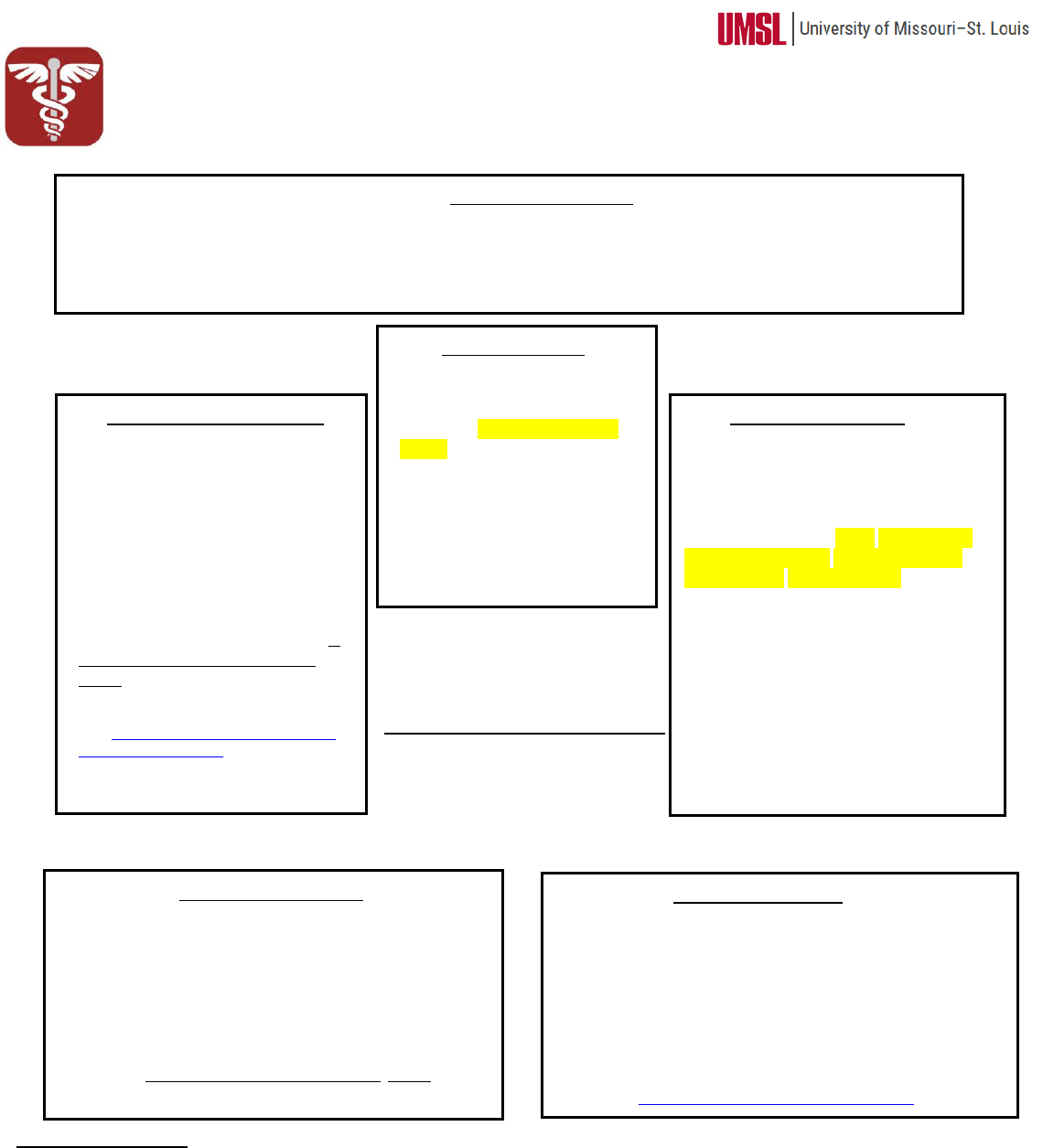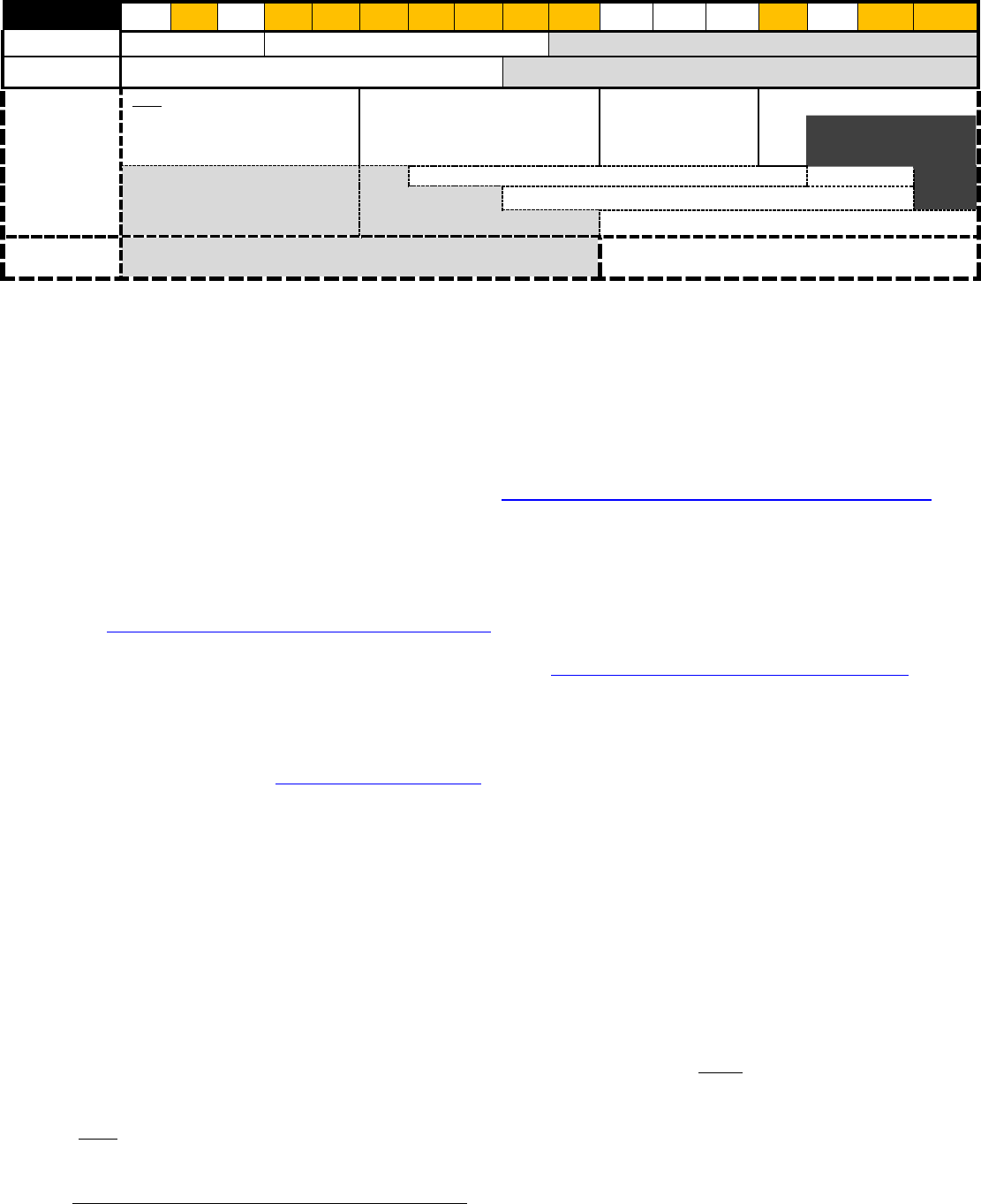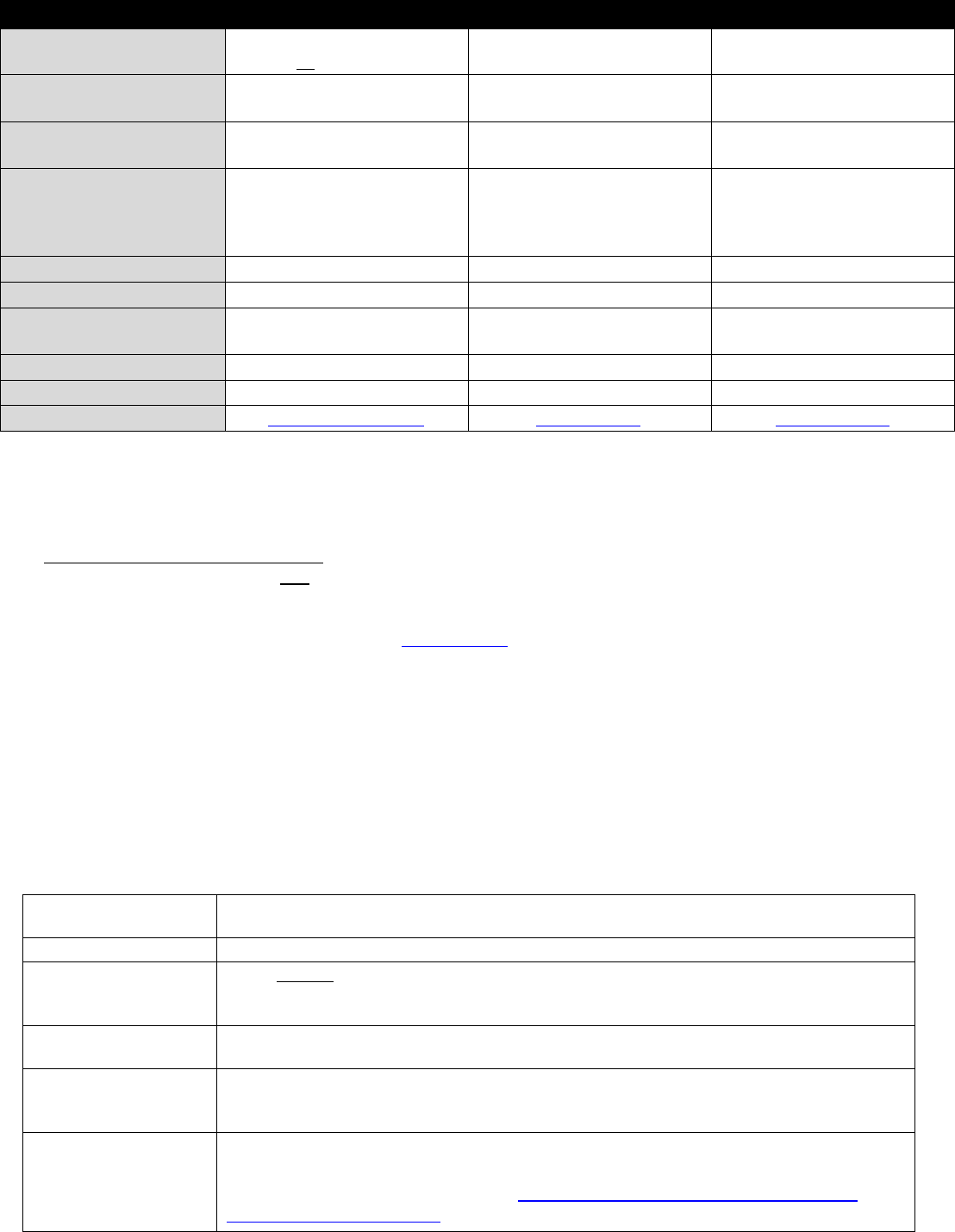
Academic Preparation
Academic preparation for medical school requires a Bachelor’s degree and completion of a set of prerequisite classes, usually
science, which vary from school to school. Common classes are listed on the last page of this summary. For your degree, any major
is appropriate. There is no preference in this regard, so study something you love! Competitive applicants have very high grades so
pace yourself in order to succeed, and remember that all grades apply (even if you repeat classes) will count when you.
Patient Exposure
Interacting well with patients is
one of the key indicators of a
successful future provider. Your
experience can be either paid or
unpaid. It may or may not require
certification. Examples include ER
volunteer, nursing home, hospice
and more. Many applicants
complete 1-2 different
experiences each lasting at least 6
months to a year, total of 100+
hrs.
Leadership Experience
As a physician, you will be a leader and a team member with
your patients, your staff, your colleagues, and in your
community. Examples of leadership includes offices in
organizations, leadership in church activities, coordinating a
project, serving on a committee, managing or training or
supervising at work, teaching experience of any kind, coaching,
peer counseling, mentoring, etc. Many applicants complete
100+ hours in 3 different experiences each lasting 3 months or
longer in the 4 years before applying to medical school.
Research Experience
Physicians depend on medical literature to remain current in
their field throughout their careers. Most medical schools
required or highly recommend participation in research that tests
a hypothesis. Your research experience can be from many
different areas. It does not have to be medically related or in a
lab. Many applicants complete at least 1 experience under a
supervision of a faculty member or other researcher lasting 6
months to a year.
Undergraduate Research Opportunities Program can be
found here: https://www.umsl.edu/studentresearch/
PREMED (M.D. and D.O.) INFORMATION SUMMARY
Complimentary Activities?
Things to Remember
• What you do outside of class is important so don’t neglect activities. However, remember that activities complement your
coursework, but they will not compensate for low grades.
• Make sure you have contact information for supervisors and physicians in case you need a recommendation letter. Try to
keep an open relationship with them after you discontinue activities.
• Keep a record of all hours of service and experiences.
• Writing reflections on each activity in a journal will be helpful when you complete your application and write your personal
statement.
Physician Shadowing This
should be one of your first experiences as a
premedical student. Observing a physician
in action will help you gather the
information you need to fully commit to
the profession and to learn about a variety
of medical specialties. Many students find
physicians to shadow through volunteer
experiences at medical facilities. Consider
shadowing doctors from a variety of
backgrounds and with both MD and DO
educations. Many applicants shadow 3-5
different physicians, spending at least 8-10
hours with each, and have a good balance
between primary care and non-primary
care.
Service to the Community
Because you are preparing for a
humanitarian profession, it is
important to have volunteer
experiences that demonstrate a
commitment to serving others in your
community. Ideally, this would be
ongoing throughout your college years
prior to application for admission.
Many applicants complete 3 different
experiences each lasting 6 months to
a year with at least 200 hours, in the 4
years before they apply to medical
school.
Want to find activities? Check out:
▪ https://www.umsl.edu/studentinvolve
ment/service/index.html

2
*this pre-med document was adapted with permission of the Pre-Professional Advising Office at the University of Utah.
APPLICATION TIMELINE
TIMELINE
Dec
Jan
Feb
Mar
Apr
May
Jun
July
Aug
Sep
Oct
Nov
Dec
Jan
Feb
Mar
Apr
MCAT
Register & Study
Take exam
LORs
Request letters & get contact info from letter writers
Application
Prep
- Write draft of Personal
Statement
- Research Schools
- Applications open online to fill
out profile/info 1
st
week of May
- Submit applications the first
week of June at the earliest
Application deadlines
Oct.-Nov. for MD
Dec.-March. for DO
If no interviews, begin
assessing reapplication
Secondary Applications
update
LORs
Interviews
Acceptance Notifications for August start dates
Financial Aid
Priority filing for federal financial aid
❖
THE MCAT
• The MCAT is administered in January, and March through September. It’s best to have all of your premedical courses completed before taking
the MCAT.
• Taking the exam by spring will enable you to apply earlier. September is the last MCAT accepted by many schools for the following Fall
entering class.
• The MCAT is divided into four multiple choice sections: Biological and Biochemical Foundations of Living Systems; Chemical and
Physical Foundations of Living Systems; Psychological, Social and Biological Foundations of Behavior; and Critical Analysis and
Reasoning Skills. You can obtain the most updated information from https://www.aamc.org/students/applying/mcat/mcat2015/.
❖
THE AAMC SJT OR ALTUIS SUITE
There are two common instruments designed to assess characteristics necessary to succeed as a physician
• AAMC Standardized Judgement Test (SJT)—This is the most common assessment used by medical schools. It was developed to
measure the pre-professional competencies outlined in the AAMC .
It has 95 – 105 minutes total session time (75 minutes exam time). It is scored from 1 (low) – 9 (high). Students will receive a test
score for AAMC SJT. For more information and preparation resources, visit AAMC Standardized Judgement Test (SJT) website.
• Altius Suite—is a 3 part assessment adopted by some medical schools. Casper is a newer situational judgement test that assesses
for 10 characteristics: Collaboration, Communication, Empathy, Equity, Ethics, Motivation, Problem Solving, Professionalism,
Resilience, and Self Awareness. Snapshot is a short one way virtual interview that highlights communication skills and motivation
for your chose profession. Duet is a value-alignment assessment that compares your values to the mission of the school. For more
information go to the Altius website https://takealtus.com/suite/.
❖
THE APPLICATION PROCESS
• Most US medical schools admit students once a year to start late Summer/early Fall.
• Applications are submitted 12-15 months before your desired medical school enrollment date. This means the application process can
begin as early as the spring after your Junior year. However, the timing depends on when you will complete your degree and the necessary
premedical coursework, and successfully take the MCAT. All degrees must be posted to your transcript prior to starting medical school, and
the timing is sensitive.
• While applying early in the cycle has advantages, the best time for you to apply is when your application is the best it can be. Many students
choose to take a gap year to strengthen their application with attention to the MCAT, time to do research, or additional shadowing opportunities.
• You can apply to both M.D. and D.O. schools, and we encourage students to consider doing so.
• Requirements vary from school to school. Research schools early for specific information about requirements.
• Before submitting applications, have people (Career Services) with an unbiased eye go over each entire application to catch any errors.
• To help us advise other students, we would appreciate it if you would release your statistical information from your applications to the
Health Professions Advisor when prompted. This information will always be kept confidential.
• There are three centralized application services processing primary applications for US medical schools: AMCAS for MD schools,
AACOMAS for DO schools, and TMDSAS for schools in the University of Texas system. These services are very similar, but not identical.
They open online in early May each year to allow applicants to start building applications and begin accepting submissions on or around
June 1st. Refer to the chart on page 3 for additional information.
• There are a handful of private schools not affiliated with any of these centralized services and require other applications. Information
is available on each school’s website.

3
*this pre-med document was adapted with permission of the Pre-Professional Advising Office at the University of Utah.
Application Comparison
TMDSAS—U of TX
AMCAS—
MD
AACOMAS—
DO
Primary Application Fee: # of
schools included
Flat fee includes all schools, but
no fee waivers
1 school included in fee,
Extra fee for each additional
1 school included in fee,
Extra fee for each additional
Add additional schools after
submission?
Yes—No additional charge
Yes—Additional charge
Yes—Additional charge
Personal statement length
1 required, 5000 char limit
2 optional, 2500 char each
1 required, 5300 char limit
1 required, 5300 char limit
Extracurricular experience
listings
Chronological list of all info
since HS graduation
(academic, extracurricular,
employment, etc.)
May list up to 15 activities
700 character limit each
Designate 3 ‘significant’
May list all activities
600 character limit each
Official MCAT Score Report
required
required
required
Official transcripts
TMDSAS form required
AMCAS form required
AACOMAS form required
GPA calculations*
Unique calculation with no
decimals
Total, BCPM, and AO
Total, BCP, and AO
Early application advantage?
Yes
Yes
Yes
Deadlines?
October 1
By school, mostly Oct or Nov
By school, mostly Dec-Apr
Website
utsystem.edu/tmdsas/
www.aamc.org.
www.aacom.org
*Total = Total GPA, BCPM = Biology, Chemistry, Physics, Math (Science) GPA, AO = All Other (Non-Science) GPA
❖ LETTERS OF RECOMMENDATION
• Once a medical school receives your primary application through the application service, the school will request supplementary
materials, including program specific secondary applications and Letters of Recommendation (LORs).
• Application services do not share letters: Be sure to plan ahead regarding where to have your letters sent.
o Applicants who plan to apply only to AMCAS, AACOMAS, or TDMSAS affiliated medical schools most often take advantage of
the Letter Service provided by those systems.
o If applying to both MD and DO schools, or including TMDSAS schools, unaffiliated schools, or an international program, it is
easiest to subscribe to a service like Interfolio (interfolio.com/) which allows you to collect all your letters in one place and have
them sent to each application service.
• Do not delay submitting your primary application while waiting for letters to arrive. Letters are part of the secondary process.
• Requirements for letters vary between schools, so research schools early and know what you need. The following are
recommendations, and generally covers the types of letters you will need. Plan ahead! Get to know people from these
categories so you will have a variety of people who can write excellent letters for you.
1. Science Professor (BCPM)
2. Non-Science Professor OR 2
nd
Science Professor (Requirements vary by school)
3. Mentor letter—Usually a Supervisor for Research, Patient Exposure, Community Service, or Employment
❖ PREMED GENERAL POLICIES REGARDING COURSEWORK
CLEP Credit &
Correspondence Study
Not acceptable as part of the premed curriculum
AP Credits
Students must take coursework beyond introductory classes waived by AP
“Online” Courses
Online sections of semester-based university classes, or online/in person hybrid sections of
semester based classes will usually be accepted. Online courses which are not university
semester based (independent study) will generally not be accepted.
Repeat Policy
All grades for repeated courses will be counted towards your GPA on your medical school
application through AMCAS, AACOMAS, and/or TMDSAS
Withdrawals
W’s or EX’s should be used only for emergencies, although W’s or Ex’s will not affect your GPA and
is better than a low grade. If you are considering withdrawals, consult your professor and advisor
first.
GPA
Generally, the minimum GPA for Total, Science, and all other is 3.75, but may be higher or lower
depending on the school. The average GPA for accepted applicants is usually in the 3.6 range for
MD schools and 3.5 range for DO schools https://www.princetonreview.com/med-school-
advice/gpa-for-medical-school.

Premedical Course Guide
This guide is designed for applying to a range of medical schools. It is not a comprehensive list. Requirements may vary by school.
[Some classes may be taken at a Community College. However, not all medical schools accept prerequisites from 2-year schools]
*Most medical schools require that you have at least 90 hours of college coursework completed. Included in the 90 hours
should be the following classes. These classes are the most common required classes for medical schools:
• English 1100: First-Year Writing
• English 3100 or 3160: Junior-Level Writing or Writing in the Sciences
• Biol 1821: Introductory Biology: Organisms and the Environment
• Biol 1831: Introductory Biology: From Molecules to Organisms
• Biol 4672: Principles of Biochemistry or Chem 4712: Biochemistry
• Chem 1111: Introductory Chemistry I
• Chem 1121: Introductory Chemistry II
• Chem 2612: Organic Chemistry I
• Chem 2622: Organic Chemistry II
• Chem 2633: Organic Chemistry Laboratory
• Physics 1011&L: Basic Physics I and Lab
• Physics 1012&L: Basic Physics II and Lab
The following aren't usually required, but are highly recommended for the MCAT:
• Psych 1003: General Psychology
• Soc 1010: Introduction to Sociology
The following may be required by some medical schools:
• Biol 2012: Genetics
• Biol 2482: Microbiology
• Biol 3622: Cell Biology
• Math 1100 or 1800: Basic Calculus or Analytic Geometry and Calculus I
• Math 1105: Basic Probability and Statistics or Math 1320: Introduction to Probability and Statistics
